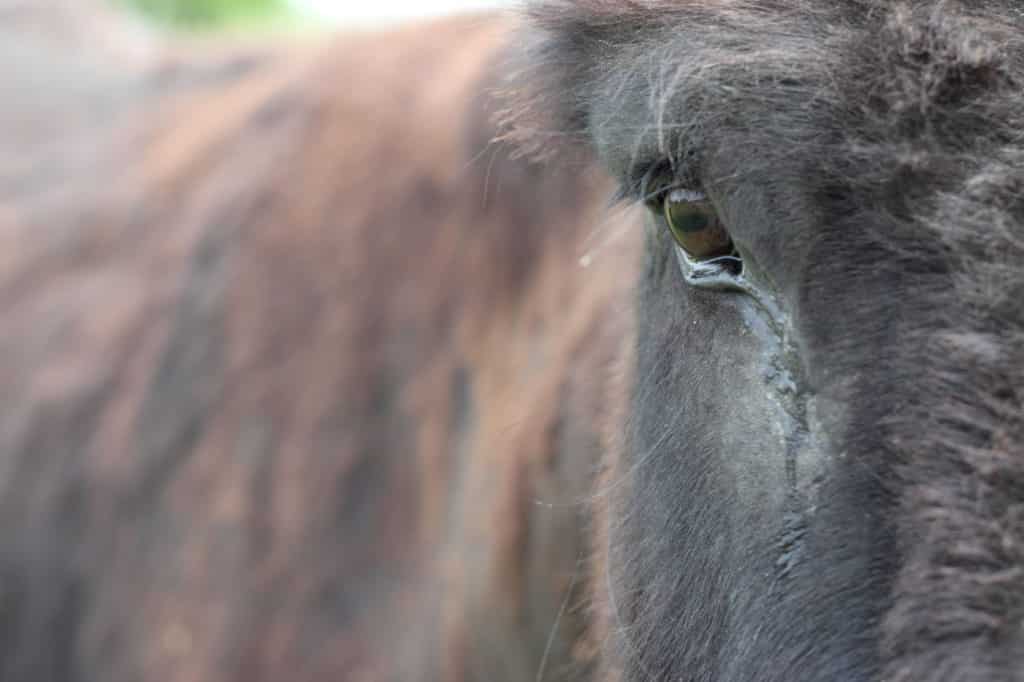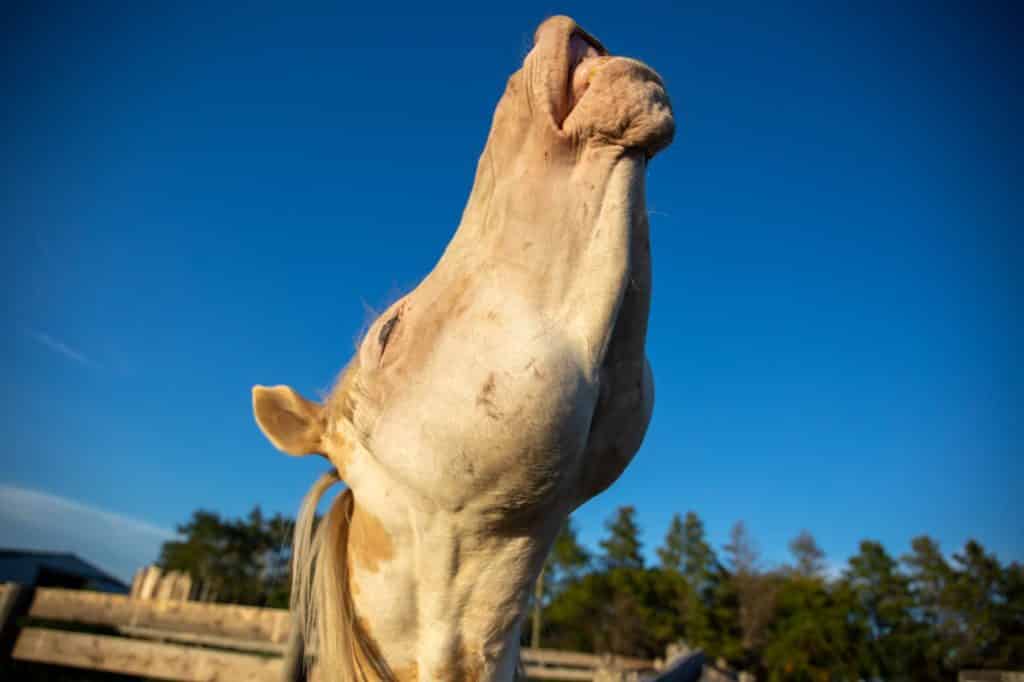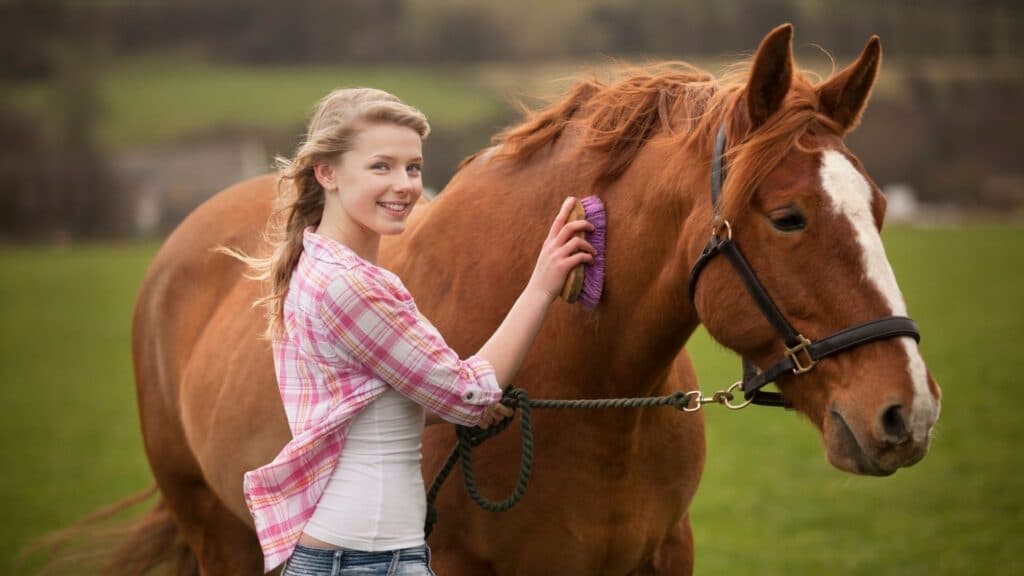Last updated: May 28, 2024
Have you ever wondered if horses, like humans, can shed tears of emotion? This question came to mind one afternoon as my granddaughter, and I were watching a couple of our horses in a paddock. One had tears flowing from his eyes, which prompted her to ask, “Why is your horse crying?”
As a long-time horse owner, I’ve spent countless hours observing and interacting with these magnificent animals, developing a deep understanding of their behaviors and emotions. In this article, I delve into the intriguing world of equine emotions.
We’ll explore whether horses cry in response to feelings, how they express their emotions, and the depth of their emotional intelligence. Join me in uncovering the truth behind the tears and the rich emotional tapestry of horses.

Horses Don’t Cry.
Crying is shedding tears in response to an emotion, such as sadness, anger, or happiness. A horse can produce tears that flow down its face. But this doesn’t equate to crying.
However, I get that some people consider the flowing of tears to be crying, so we need to be more precise when we ask the question, “Do horses cry.” Are we asking if horses cry tears in response to a situation? If this is the question, then the answer is no; horses don’t cry.
But if the question is broad, such as do horses shed excessive tears that flow down their faces, then the answer is yes, horses cry. There are three types of tear production: basal, psychic, and reflex.
Basal tear production is regular eye moisture.
Basal tear production is the regular and constant moisture needed for the proper functioning of the eyes. Failure of the creation of basal tears is a severe eye condition that must be treated or permanent damage could result.
Psychic tear production occurs in response to emotional stimulus
Tear production that occurs in reaction to an emotional stimulus, such as pain or sadness, is called psychic tear production. Humans are the only species confirmed to stimulate tear production based on psychic responses.
Tears produced because of an irritant is reflex tear production
Increased tear production with an irritation of the eyes or sinus is a reflex tear production. When we see horses cry, it is not emotional but actually, reflex tear production caused by an irritant or blocked ducts.
Do Horses Have Feelings?
When my granddaughter gets close to the pasture, our horses lift their heads and start whinnying. These actions make me feel that the horses are displaying their joy to see her.
Horses have feelings. We know this because they signal their attitude both vocally and with body language. A French research team published a 2018 peer-reviewed study of a horse’s ability to vocalize emotion.
What the researchers were able to extrapolate from their study is a horse’s snort is a signal of positive emotion. You can read the article here, “An Unexpected Acoustic Indicator of positive emotions in horses.”
If we assume that horses have feelings, the next question is, do they have the same range of emotions that humans have? Scientific studies don’t provide an answer to this question.
We must rely on our experiences and the experiences of others to make a reasonable guess of which emotions horses possess. Most horse people believe they display fear, anger, curiosity, confusion, sadness, and happiness.
Horses don’t have high-level emotions.
Emotions such as guilt, embarrassment, and respect are too high-level feelings for horses. Knowing a horse has emotions is another nugget of information we can use to help us communicate with them.
The key for us is to be able to read signs of emotions given by a horse. However, horses cry because of sinus congestion and blocked tear ducts, not as a show of emotion.
Horses express emotions with their Ears.
Horses are herd animals, and they communicate feelings to the members of their herd in various ways. One of their methods is through the positioning of their ears. Some emotions a horse conveys with its ears are comfort, fear, anger, and danger.
When you see a horse with his ears pinned back, you need to be aware that he is mad, ears forward to let you know he is attentive, and ears flopped down may mean he is bored or tired. To learn more about the signals horses send with their ears, read this article; we wrote: “What does a Horses Ears Tell You.”
Horses express emotions with sounds.

Horses use a simple variation of snorts and squeals, neighs and nickers, to convey mood changes:
- Snorts: The horse holds his head high and powerfully blows out through his nose while keeping his body tense. This is a sign of curiosity and fear, a warning signal.
- Squeals: A horse will make a high-pitched squeal with his mouth closed or partially closed. Horses do this when they are in pain or when a mare is sending signals to a stallion.
- Nickers: Horses have three nickers: the greeting nicker, the courtship nicker, and the maternal nicker. All are comforting greetings but with varying undertones.
- Neighs: This is a sign of curiosity; it begins with a squeal and ends with a nickel. Horses often neigh when they are separated from a herd.
- Roars: Horses roar when they are angry; it usually only occurs in the wild.
- Blows: This is the signal that he feels good. It’s a simple release of air through the nostrils.
To learn more about how horses communicate through sounds, read our article here. Learning the signals horses use to communicate helps us to understand them better and makes training them much more natural.
Horses express emotion with their eyes.
A study of equine facial expressions performed at the University of Sussex in the United Kingdom determined horses convey emotions with their eyes. The following are some of the expressions they charted:
- Upper eyelid raiser and white eye increase: Raising the eyelid and increasing the exposure of the white is a sign of fear.
- Raised inner brows: Horses don’t have an eyebrow like humans, but they do have an expression that raises the inner corner of the eye. When a horse raises the inner corner of the eye, it is expressing feelings of sadness or fearfulness.
But horses’ crying isn’t a sign of emotion but rather a result of a blocked tear duct.
Can Horses Sense When You Are Afraid of Them?
Our horses are exposed to our grandchildren daily, and they are incredibly calm and patient around kids. However, one day, they had a friend over to ride, and the horses acted entirely out of character.
Horses sense fear from a rider. It’s unclear if the horse picks up on fear or inexperience. However, a study of horses exposed to people afraid of horses found that their reaction was somewhat surprising.
The study published in the Journal of Veterinary Behavior monitors humans, and horses’ heart rates while in a round pen. The round pen included persons afraid of horses and those comfortable around horses.
The humans were blindfolded, and the horse was allowed to walk around the subjects. The study found that horses reacted differently around each group.
The horse’s heart rate dropped when near the sensitive subjects, and they also lowered their heads. These two reactions of the horses display a calmer demeanor around nervous human subjects.
The study concluded horses in the presence of people who are afraid of horses are not at an increased risk of danger. Horses are individuals and are massive, unpredictable animals, so be vigilant around horses and follow safety precautions when around them.
Interesting Fact: Horses can’t smell fear in humans, but they can smell fear in other horses.
Do Horses Remember You?
We went to a rodeo one weekend, and competing was a paint horse we sold to a family. It had been many years since I’d seen the paint horse, but when I approached, he treated me like an old friend.
Horses remember people, especially the ones that have treated them well. Horses also remember their training after many years.
We once had a farrier put his arm over the muzzle of each new horse he shod. One day I asked him about this practice, and he told me that he does this to allow the horse to get his scent.

He believed that once a horse got a good whiff of someone, it always remembered the person. Recent research has confirmed that horses do remember people for long periods.
Good memory is an inherent trait from herd socialization, and horses relied on their minds to recognize pleasant horses of other herds and ones that were threats.
The study involved vet examinations followed by treats for some horses. Others were examined and not given treats. The horses given treats behaved much better after gaps of treatment of eight months and gravitated to the person who provided the horses the treats.
The researchers determined that horses learned, behaved, and memorized better when learning was associated with a positive stimulus. This method of training is similar to that used by dogs. Using a treat with training can be effective because of horses’ unique skills.
Other studies show that horses have highly effective memories for both good and bad experiences. Testing has shown that horses can recall past experiences and react to them readily.
Do Horses Know Their Names?
I can go out in my pasture and call a horse’s name every time they come, or none come. I continue to address my horses by their names, but I don’t know if they understand.
Horses may recognize their names when said by their owners. But horses are very attuned to reading human body language and audible tones and could be reacting to sounds and not words.
When being called, a horse recognizes the pitch and tone in their owner’s voice. If another person calls the horse by the same name, the horse will likely not respond.
Do Horses Miss Their Owners?
Some of our horses are more sensitive than others. If we are gone for a few days, one horse gets excited about our return, and the others don’t seem to react any differently.
Most horses get excited immediately when they hear their caretaker or owner’s voice. It’s easy to recognize your horse’s happiness after returning home from a long vacation.
But, if you see tears, it’s not related to sadness; horses cry or instead shed tears because of blocked tear ducts; it’s not an expression of emotion.
How do You Tell a Horse You Love Them?
- The best way you can show a horse that you care for them is to groom them daily;
- Next, make sure they are adequately fed and provide a treat once a day;
- Don’t overwork your horses; find a happy medium when it comes to training;
- Provide a clean and safe environment for them;
- Make sure they have proper health care, feet, teeth, worming, and shots.
- Spend some time hand-grazing your horse.
Conclusion
In our exploration of horses’ emotional world, we’ve uncovered that while horses may not cry in the human sense, they are indeed capable of expressing a range of emotions. From the joyous snorts greeting a familiar face to the pinned ears signaling discomfort or anger, horses communicate their feelings in unique ways.
The tears we sometimes see are not signs of emotional crying but rather a physical response to irritants or blocked tear ducts. However, this does not diminish the depth and authenticity of their emotional experiences. Horses, like us, feel joy, sadness, fear, and contentment; they express these emotions through their body language, sounds, and actions.
Understanding these expressions is crucial for anyone who interacts with horses. It helps build a stronger bond with these magnificent creatures and ensure their well-being. As we continue to learn and observe, let us appreciate the complex emotional lives of horses and recognize the importance of empathetic and informed care in our interactions with them.
This journey into the emotional lives of horses reminds us of the profound connections possible between humans and animals, enriching our understanding and appreciation of these noble companions.
Call to Action
As we conclude our exploration into the emotional world of horses, I invite you to deepen your connection with these magnificent creatures. Understanding their emotions and expressions is just the beginning of a rewarding journey. Here’s how you can continue to engage and learn:
- Observe and Interact: Spend time observing horses in different environments. Notice their body language, sounds, and reactions to various situations. This hands-on experience is invaluable in understanding their emotional language.
- Share Your Experiences: Have you noticed unique ways in which horses express their emotions? Maybe you’ve seen a horse ‘cry’ or show joy. Share your stories and observations in the comments section below. Your experiences can help others learn and appreciate the depth of horses’ emotions.
- Learn More: Dive deeper into equine behavior and psychology. There are numerous books, documentaries, and online resources available. The more you learn, the stronger your bond with horses will become.
- Join a Community: Connect with other horse enthusiasts and experts. Online forums, social media groups, and local equestrian clubs are great places to share knowledge and experiences.
- Support Equine Welfare: Consider supporting organizations that work towards the welfare and better understanding of horses. Your support can contribute to research, rescue, and education about these noble animals.
Remember, every interaction with a horse is an opportunity to understand and appreciate their complex emotional world. Let’s continue to learn, share, and grow in our journey with horses.
Related articles
- Why do horses repeatedly nod their heads?
- Why horses have short tails
- Why some horses wear blankets
- 12 Horse Coat Colors: Patterns, Genetics, and Pictures
- What Does a Horse Eat? An Essential Feeding Guide

About the Author: Miles Henry
Lifelong Horseman | Racehorse Owner | Published Author
Miles Henry brings over 25 years of hands-on experience training and owning Thoroughbred racehorses. Raised with Quarter Horses and Appaloosas, he’s spent a lifetime learning from horses—on the track, in the barn, and in the field. Today, he runs a small but successful racing stable in Louisiana and shares real-world insights on HorseRacingSense.com, helping horse owners, fans, and bettors navigate the sport with confidence.
📚 Books: View Miles’s books on Amazon »
🎧 Podcast Guest: Animal Tales Ep. 32 |
YouTube Interview
📩 Newsletter: Sign up for racing tips and horse care advice »
🔗 Follow Miles:
Twitter |
Facebook |
YouTube

